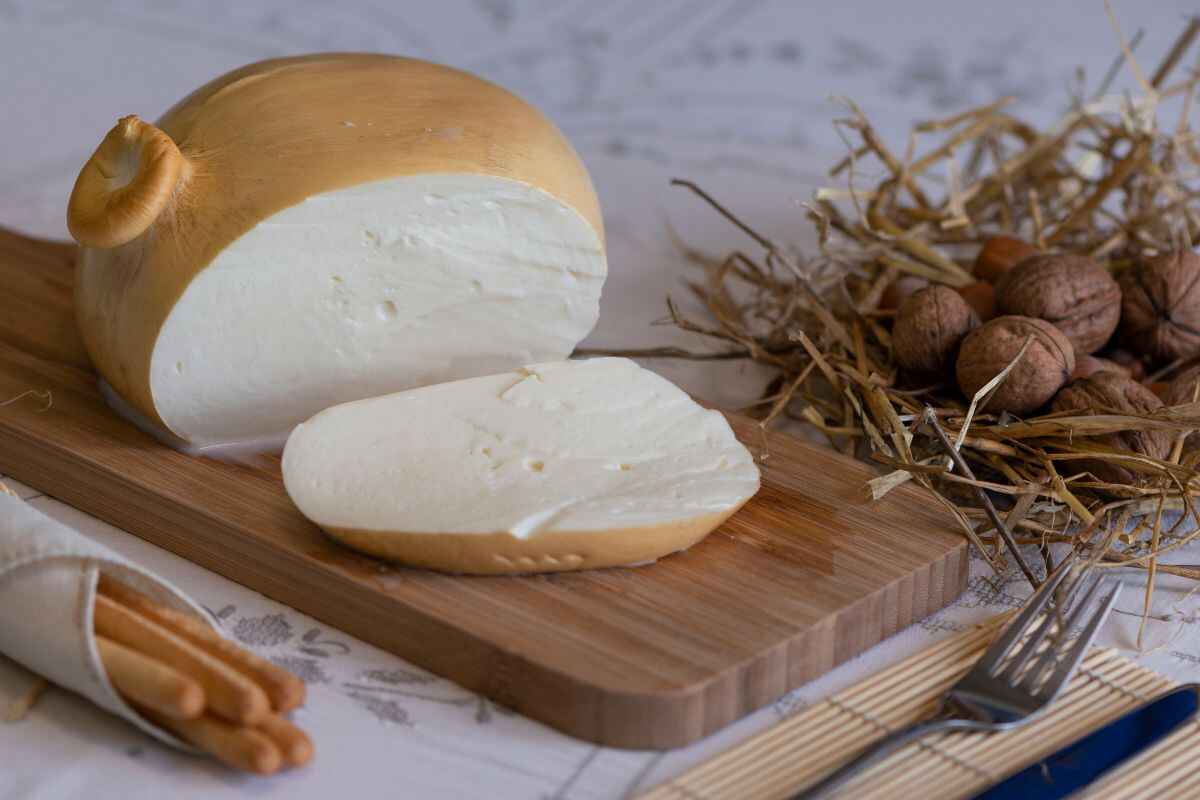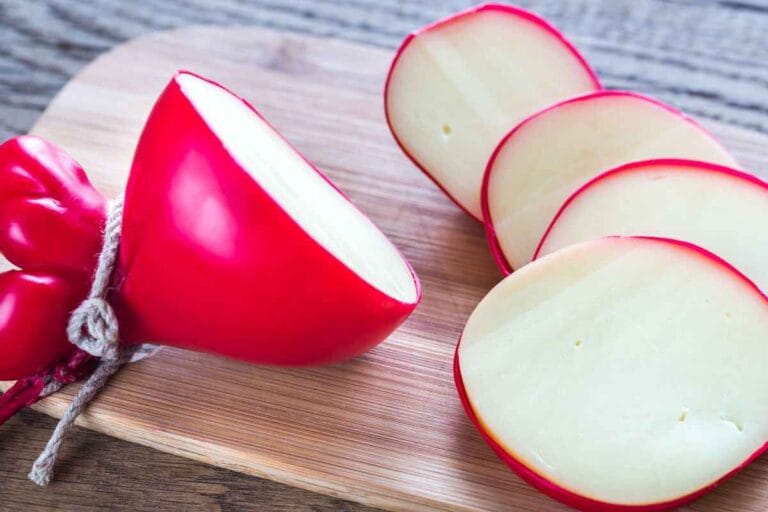Hey there, cheese lovers! 🧀 Have you ever wondered if indulging in that delicious slice of provolone is good for you? With so many cheeses out there, it can be tricky to figure out which ones fit into a healthy diet. Today, we’re diving deep into the world of provolone cheese to answer the burning question: Is provolone cheese healthy? Whether you’re a cheese enthusiast or just curious about your favorite dairy delight, this article has got you covered!
Table of Contents
What is Provolone Cheese?
History and Origin of Provolone 🌍
Provolone cheese comes from Italy, especially from areas like Campania and Lombardy. The name “provolone” comes from the Italian word “provola,” which means “ball.” This is because the cheese was first made in round shapes. Provolone started in the 1800s and was made by stretching the cheese curds, similar to how mozzarella is made. Over time, provolone developed into different types, each with its own unique taste and texture.
Varieties of Provolone Cheese 🍽️
Provolone isn’t just one kind of cheese. There are several types, each offering a different flavor experience:
- Provolone Dolce: This is the younger and milder version of provolone. It’s smooth and creamy, making it perfect for sandwiches and snacks.
- Provolone Piccante: Aged longer, this type has a sharper and stronger flavor. It’s great for grating over dishes like pasta and salads.
- Provolone Valpadana: This cheese has a special status called PDO (Protected Designation of Origin). This means it follows strict rules to ensure high quality and authentic taste.
Each variety of provolone cheese adds something special to your meals, making it a versatile choice for different recipes. Whether you like mild or strong flavors, there’s a provolone cheese that fits your taste and keeps your diet healthy. 🧀
Nutritional Profile of Provolone
Macronutrients: Protein, Fats, and Carbohydrates
Understanding the macronutrient content of provolone can help you decide how it fits into your diet:
| Nutrient | Amount per 100g |
|---|---|
| Calories | 350 kcal |
| Protein | 25g |
| Fat | 27g |
| Carbohydrates | 2g |
| Sodium | 800mg |
As you can see, provolone is rich in protein and fats, with minimal carbohydrates. This makes it a great option for those following low-carb or high-protein diets. However, it’s essential to be mindful of the sodium content if you’re watching your salt intake. 🧂
Vitamins and Minerals in Provolone
Provolone isn’t just about macronutrients; it’s packed with essential vitamins and minerals that contribute to overall health:
- Calcium: Vital for strong bones and teeth.
- Vitamin A: Supports eye health and the immune system.
- Vitamin B12: Important for nerve function and the production of DNA and red blood cells.
- Zinc: Boosts the immune system and aids in wound healing.
Including provolone in your diet can help you meet your daily requirements for these essential nutrients. 🦴
Health Benefits of Provolone Cheese
Bone Health and Calcium Content 🦷
Provolone cheese is a great source of calcium, which is super important for keeping your bones and teeth strong. Getting enough calcium can help prevent your bones from getting weak as you get older. Just one serving of provolone can give you a good amount of the calcium you need each day.
Protein Source for Muscle Maintenance 💪
Provolone has a lot of protein—about 25 grams in every 100 grams. Protein is essential for building and keeping your muscles strong. Whether you’re playing sports, working out, or just staying active, the protein in provolone helps your muscles grow and repair. Plus, protein helps you feel full longer, which can help you manage your weight better.
Gut Health and Probiotics 🦠
Some types of provolone cheese have probiotics. Probiotics are good bacteria that help keep your tummy healthy. A healthy gut can improve how you digest food, boost your immune system, and even make you feel better mentally. Eating probiotic-rich foods like provolone can help you feel good overall.
“Cheese, like provolone, not only adds flavor to your meals but also provides essential nutrients that support various aspects of your health.” – Nutrition Expert
Potential Health Concerns
High Sodium Content and Its Impacts 🩺
Is Provolone Cheese Healthy? One thing to watch out for is the high sodium content in provolone cheese. With around 800mg of sodium per 100g, provolone can add a lot of salt to your daily diet. Eating too much sodium is linked to high blood pressure, which can increase the risk of heart disease and stroke. 🧂
Saturated Fats and Heart Health ❤️
Is Provolone Cheese Healthy? Provolone is also high in saturated fats. Consuming too many saturated fats can raise your LDL (bad) cholesterol levels. High LDL cholesterol is a major risk factor for heart disease. While your body needs some saturated fat for energy and other functions, it’s important to eat provolone in moderation to keep your heart healthy. ❤️
Lactose Intolerance Considerations 🥛
Is Provolone Cheese Healthy? If you’re lactose intolerant, you might worry about eating provolone cheese. The good news is that hard cheeses like provolone usually have lower levels of lactose compared to soft cheeses. This means many people who are lactose intolerant can enjoy provolone in small amounts without having problems. If you’re sensitive, start with a little provolone to see how your body reacts. 🥛
Common Problems and Solutions (Is Provolone Cheese Healthy?)
Managing Sodium Intake with Provolone 🥗
Worried about the salt in provolone cheese? Don’t worry! Here are some easy tips to help you enjoy provolone without too much sodium:
- Portion Control: Eat small amounts of provolone to keep your salt intake low.
- Balance Your Diet: Pair provolone with low-sodium foods like fresh vegetables and whole grains.
- Choose Lower-Sodium Options: Some brands offer reduced-sodium provolone cheese.
By being careful about how much provolone you eat and balancing it with other healthy foods, you can enjoy its delicious taste without the extra salt. This helps keep your heart healthy and your diet on track. 🧂
Choosing Low-Fat Provolone Options 🏃♀️
If you’re concerned about the fat in provolone cheese, try low-fat provolone varieties. These cheeses have fewer calories and less fat but still taste great. Here’s how to make healthier choices:
- Read Labels: Look for provolone cheese labeled as low-fat or reduced-fat.
- Compare Brands: Some brands offer healthier options with less saturated fat.
- Check Ingredients: Choose provolone with simple ingredients and no added unhealthy fats.
Low-fat provolone is a smart choice if you want to enjoy cheese while keeping your heart and waistline healthy. Always check the labels to make sure you’re picking the best option for your diet. 🍽️
Alternatives for Lactose-Intolerant Individuals 🌱
If you can’t handle lactose but still want to enjoy provolone cheese, here are some great alternatives:
- Lactose-Free Provolone: Some brands make provolone without lactose, so it’s easier to digest.
- Harder Cheeses: Aged provolone has even less lactose, making it a better choice for those who are lactose intolerant.
- Plant-Based Alternatives: Try dairy-free cheeses made from nuts or soy for a lactose-free option.
These alternatives let you enjoy the tasty flavor of provolone without the tummy troubles. Whether you choose lactose-free, aged, or plant-based cheeses, there are plenty of ways to include provolone in your diet comfortably. 🥛

Comparing Provolone to Other Cheeses (Is Provolone Cheese Healthy?)
Provolone vs. Mozzarella
Both provolone and mozzarella are Italian cheeses, but they have some key differences:
| Aspect | Provolone | Mozzarella |
|---|---|---|
| Flavor | Sharp and robust | Mild and creamy |
| Texture | Firm and stretchy | Soft and elastic |
| Calories | 350 kcal per 100g | 280 kcal per 100g |
| Sodium | 800mg per 100g | 600mg per 100g |
While both cheeses offer nutritional benefits, provolone tends to be higher in calories and sodium compared to mozzarella. Your choice between the two might depend on your flavor preference and dietary goals. 🧀
Provolone vs. Cheddar
Cheddar and provolone are popular cheeses worldwide, but they cater to different tastes and nutritional needs:
- Flavor: Cheddar is known for its sharpness, whereas provolone has a milder, more nuanced taste.
- Fat Content: Cheddar generally has a higher fat content compared to provolone.
- Versatility: Provolone is more versatile in melting applications, making it ideal for sandwiches and pizzas.
Choosing between cheddar and provolone depends on your taste preferences and how you plan to use the cheese in your meals. 🥪
Provolone vs. Swiss
Swiss cheese and provolone are both excellent melting cheeses, but they differ in taste and nutritional profile:
| Aspect | Provolone | Swiss |
|---|---|---|
| Flavor | Sharp and creamy | Nutty and mild |
| Texture | Firm and stretchy | Firm with characteristic holes |
| Calories | 350 kcal per 100g | 380 kcal per 100g |
| Sodium | 800mg per 100g | 900mg per 100g |
Swiss cheese has a slightly higher calorie and sodium content compared to provolone. If you’re looking for a cheese with a nutty flavor and don’t mind the extra sodium, Swiss might be your go-to. Otherwise, provolone offers a robust alternative. 🧀
(Is Provolone Cheese Healthy?)
How to Incorporate Provolone into a Healthy Diet
Portion Control Tips 🍽️
Enjoying provolone cheese doesn’t mean eating too much. Here are some simple tips to help you control how much you eat:
- Measure Your Servings: Use a kitchen scale or measuring cups to know how much provolone you are eating.
- Pair with Veggies: Add fresh vegetables like lettuce, tomatoes, and cucumbers to your meals with provolone.
- Use as a Flavor Enhancer: Sprinkle a little provolone on your dishes to add taste without using too much.
By watching your portions, you can enjoy the yummy taste of provolone while keeping your diet balanced and healthy. 🥗
Healthy Recipe Ideas Featuring Provolone 🥪
Want to add provolone to your meals in a healthy way? Try these easy and tasty recipes:
- Provolone and Veggie Sandwich: Put slices of provolone with fresh veggies like lettuce, tomatoes, and cucumbers on whole-grain bread.
- Grilled Provolone Sandwich: Make a healthy grilled cheese with provolone, spinach, and a little pesto on whole-grain bread.
- Provolone Stuffed Peppers: Fill bell peppers with quinoa, vegetables, and provolone cheese for a tasty and balanced meal.
These recipes are not only delicious but also include healthy ingredients to keep your meals balanced and satisfying. 🍴
Myths and Facts About Provolone Cheese(Is Provolone Cheese Healthy?)
Debunking Common Misconceptions 🧐
Is Provolone Cheese Healthy? Let’s clear up some common myths about provolone cheese:
- Myth: All cheeses are bad for your health.
- Fact: Many cheeses, including provolone, have important nutrients like protein and calcium. When eaten in moderation, they can be part of a healthy diet.
- Myth: Provolone causes weight gain.
- Fact: Gaining weight usually happens when you eat too many calories, not just from provolone. Enjoying provolone in reasonable amounts fits into a healthy eating plan.
It’s important to know the facts so you can make smart choices about what you eat. 🧀
Evidence-Based Insights 📚
Is Provolone Cheese Healthy? Yes! Studies show that provolone cheese can be good for your health. Here’s what research says:
- Bone Health: Provolone is rich in calcium, which helps keep your bones and teeth strong.
- Muscle Maintenance: The high protein in provolone helps keep your muscles strong and healthy.
- Overall Health: Provolone provides vitamins and minerals like Vitamin A and B12, which are important for your body.
Remember to eat provolone in moderation because it has sodium and saturated fat. Balance it with other healthy foods to get the best benefits. 🦴
Tips for Choosing Quality Provolone (Is Provolone Cheese Healthy?)
Reading Labels and Understanding Ingredients 🏷️
Is Provolone Cheese Healthy? Choosing the right provolone cheese is easy if you know what to look for. Here are some simple tips:
- Check for PDO Certification: Provolone Valpadana has a Protected Designation of Origin (PDO) status. This means it meets high-quality standards.
- Avoid Additives: The best provolone has simple ingredients like milk, salt, and rennet. Avoid cheeses with lots of extra ingredients.
- Understand Fat Content: Decide if you want full-fat or low-fat provolone based on your dietary needs.
By reading labels carefully, you can choose provolone cheese that is both tasty and good for you. 📋eese that is both tasty and good for you. 📋
Frequently Asked Questions (FAQ)Is Provolone Cheese Healthy?
Is Provolone Cheese Suitable for a Low-Carb Diet? 🥑
Yes! Is Provolone Cheese Healthy? Provolone cheese is low in carbohydrates, making it perfect for those following a low-carb or ketogenic diet. With only about 2g of carbs per 100g, you can enjoy provolone without worrying about adding too many carbs to your meals. It’s a tasty and healthy choice for a low-carb lifestyle.
Can Lactose-Intolerant Individuals Enjoy Provolone Cheese? 🥛
Absolutely! Is Provolone Cheese Healthy? Even if you’re lactose intolerant, you can still enjoy provolone cheese. Hard cheeses like provolone have less lactose than soft cheeses, making them easier to digest. Start with small amounts to see how your body reacts. For more tips and yummy recipes, check out this guide.
How Does Provolone Cheese Compare to Other Cheeses in Terms of Calories? 🔥
Is Provolone Cheese Healthy? Provolone cheese has about 350 calories per 100g. This is similar to other cheeses like cheddar (around 400 kcal) and Swiss (about 380 kcal). It’s a bit lower in calories than some cheeses, making provolone a good choice if you’re watching your calorie intake while still enjoying delicious cheese.
What Are the Best Ways to Incorporate Provolone into My Meals? 🍴
Is Provolone Cheese Healthy? Yes! Provolone is very versatile and can be added to many dishes to make them tastier and healthier. Here are some easy ways to include provolone in your meals:
- Provolone and Veggie Sandwich: Add slices of provolone with fresh veggies like lettuce, tomatoes, and cucumbers on whole-grain bread for a healthy sandwich.
- Grilled Provolone Sandwich: Make a yummy grilled cheese with provolone, spinach, and a little pesto on whole-grain bread. Grill until the cheese melts and the bread is crispy.
- Provolone Stuffed Peppers: Fill bell peppers with quinoa, vegetables, and provolone cheese. Bake until the peppers are soft and the cheese is melted for a tasty and balanced meal.
These recipes are not only delicious but also include healthy ingredients to keep your meals balanced and satisfying.
Is Provolone Cheese Good for Bone Health? 🦴
Yes! Is Provolone Cheese Healthy? Provolone cheese is a great source of calcium, which is important for keeping your bones and teeth strong. Including provolone in your diet helps you get the calcium you need each day, supporting overall bone health and reducing the risk of osteoporosis. Additionally, the protein in provolone helps keep your muscles strong and healthy. contributing to overall physical health.contributing to overall physical health. 🦴
Conclusion About Is Provolone Cheese Healthy?
So, is provolone cheese healthy? The answer isn’t a simple yes or no. Provolone cheese offers a range of nutritional benefits, including high protein and calcium content, which support muscle maintenance and bone health. However, it’s also high in sodium and saturated fats, which can pose health risks if consumed in excess. The key is moderation and making informed choices about portion sizes and the types of provolone you include in your diet.
By understanding the nutritional profile and potential health impacts of provolone, you can enjoy this tasty cheese as part of a balanced and healthy diet. 🥰 Remember, it’s all about balance and making choices that align with your health goals!

